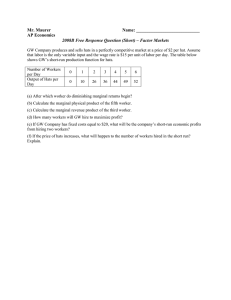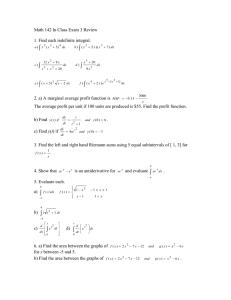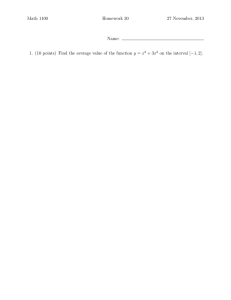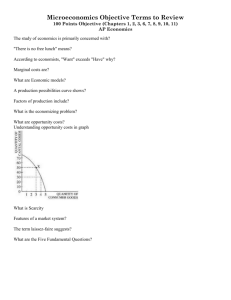ECON 1100 – Global Economics (Section 06) Multiple Choice Questions (
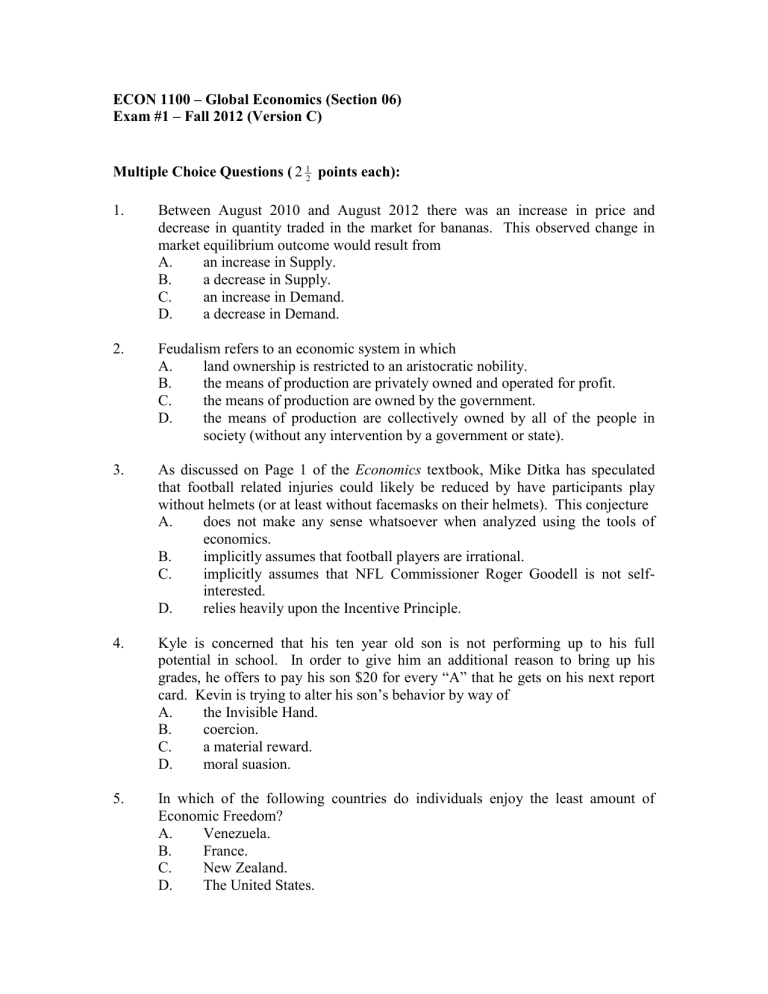
ECON 1100 – Global Economics (Section 06)
Exam #1 – Fall 2012 (Version C)
5.
2.
Multiple Choice Questions ( 2 1
2
points each):
1. Between August 2010 and August 2012 there was an increase in price and decrease in quantity traded in the market for bananas. This observed change in market equilibrium outcome would result from
A. an increase in Supply.
B. a decrease in Supply.
C. an increase in Demand.
D. a decrease in Demand.
Feudalism refers to an economic system in which
A. land ownership is restricted to an aristocratic nobility.
B. the means of production are privately owned and operated for profit.
C. the means of production are owned by the government.
D. the means of production are collectively owned by all of the people in society (without any intervention by a government or state).
3. As discussed on Page 1 of the Economics textbook, Mike Ditka has speculated that football related injuries could likely be reduced by have participants play without helmets (or at least without facemasks on their helmets). This conjecture
A. does not make any sense whatsoever when analyzed using the tools of economics.
B. implicitly assumes that football players are irrational.
C. implicitly assumes that NFL Commissioner Roger Goodell is not selfinterested.
D. relies heavily upon the Incentive Principle.
4. Kyle is concerned that his ten year old son is not performing up to his full potential in school. In order to give him an additional reason to bring up his grades, he offers to pay his son $20 for every “A” that he gets on his next report card. Kevin is trying to alter his son’s behavior by way of
A. the Invisible Hand.
B. coercion.
C. a material reward.
D. moral suasion.
In which of the following countries do individuals enjoy the least amount of
Economic Freedom?
A. Venezuela.
B. France.
C. New Zealand.
D. The United States.
6. The economy of the former Soviet Union
A. was the motivating example for Adam Smith’s argument for why the
Invisible Hand of the free market will typically allocate resources in an efficient manner.
B. perhaps provides the best example of a large society with an economic system close to “pure socialism.”
C. functioned so efficiently that the country produced a combination of goods beyond its production possibilities curve year after year after year.
D. More than one (perhaps all) of the above answers is correct.
7. Armen Alchain and Gordon Tullock
A. wrote a letter to President Obama in March 2010, advising him to not sign the “Patient Protection and Affordable Care Act.”
B. were the first to recognize that tariffs and import quotas always increase the general welfare of society.
C. illustrated, in their book The Theory of Moral Sentiments (1759), the degree to which most people are self-interested.
D. argued that automobile accident rates could be decreased by installing a sharp, irremovable, foot long, iron spike to the steering wheel of every car.
For Questions 8 through 10, consider a society consisting of only two workers, Jen and
Ben, who spend their workdays producing either soup or hats. The productive ability of each worker for each task is summarized in the table below (which states the number of units of each good that the worker could produce in a full day):
Soup Hats
Ben 60 bowls per day 30 hats per day
Jen 80 bowls per day 20 hats per day
8. _____ has an Absolute Advantage in the production of Soup; _____ has an
Absolute Advantage in the production of Hats.
A. Ben; Jen.
B. Jen; Ben.
C. Ben; Ben.
D. Jen; Jen.
9. Based upon the given information, Jen’s Opportunity Cost for producing a hat is
A. 20 hats.
B. $20.
C.
D.
4 bowls of soup. one quarter of a bowl of soup.
10. Jen has a Comparative Advantage in
A. the production of hats (but not in the production of soup).
B. the production of soup (but not in the production of hats).
C. the production of both soup and hats.
D. the production of neither soup nor hats.
11. Alec Nove described _____________ as “when the state uses influence, subsidies, grants, [and] taxes [to influence economic decisions], but does not compel.”
A. the free market
B. Consumer Sovereignty
C. Command Planning
D. Indicative Planning
12. The present economic system of the Germany would be most accurately described as ________________________, while the present economic system of Canada
________________________.
A. Feudalism; would be most accurately described as a Mixed Economy.
B. Pure Capitalism; would be most accurately described as Pure Socialism.
C. a Mixed Economy: would be most accurately described as Pure Socialism.
D. a Mixed Economy; would also be most accurately described as a Mixed
Economy.
13. Ralphie got a Red Ryder BB Gun for Christmas last year. He has decided to sell this item to Grover for $35 in order to have some money to buy a new baseball glove. When selling his BB Gun to Grover, Ralphie is exercising which of the following sub-dimension of property rights?
A. The right to control.
B.
C.
D.
The right to transfer.
The right to restitution.
The right to bear arms.
14.
Which of the following is an example of a “Produced Asset”?
A. The Volkswagen Automotive Assembly Plant near Chattanooga, TN.
B. New York Harbor, at the mouth of the Hudson River in New York, NY.
C. The Vogtle Nuclear Electric Generating Plant near Augusta, GA.
D. More than one (perhaps all) of the above answers is correct.
15. Perry enjoys going to the movies. In August he saw 4 movies in the theatre. His
Marginal Benefit of the 4 th was $8, while his Marginal Cost of the 4 th movie was
$10. Based upon this information alone, his Economic Surplus
A. would have been larger if he had instead gone to the movies only 3 times.
B. would have been maximized by going to the movies exactly 3 times.
C. would have been larger if he had instead gone to the movies 5 times.
D. More than one (perhaps all) of the above answers is correct.
16. Which of the following type of Economic Institution is NOT a “decision making” institution?
A. Government.
B. Firms.
C. Households.
D. None of the above answers are correct (since each type of institution listed is a “decision making” institution).
17. William recently attended the Georgia Tech/University of Virginia football game at Bobby Dodd Stadium. His Total Benefits from attending this game were $85, while his Total Costs were $60. From this information, it follows that his
Economic Surplus
A. from attending the game was ($85)+($60) = ($145).
B. from attending the game was ($85)–($60) = ($25).
C. from attending the game was ($60)–($85) = ($–25) (i.e., negative $25).
D. would have been greater if he had instead spent the $60 on a pay-per-view mixed martial arts event.
For Questions 18 through 20, consider a society facing the Production Possibilities
Frontier illustrated below: beef
1,350
1,000
800
500
375
0
0
A
300 320
B
C
420
D
600 shirts
18. Which of the following combinations of output is “feasible and characterized by productive efficiency”?
A. “A” (300 shirts and 375 units of beef).
B.
“B” (420 shirts and 800 units of beef).
C.
“C” (420 shirts and 1,000 units of beef).
D. More than one (perhaps all) of the above answers is correct.
19. If this society wanted to produce 525 shirts, then their maximum output of beef would be
A. more than 800 but fewer than 1,000 units of beef.
B. exactly 800 units of beef.
C.
D. more than 500 but fewer than 800 units of beef. exactly 500 units of beef.
20.
Focusing on points “B” and “D” in the graph above, the opportunity cost of producing an additional shirt is
A. greater at point “B” than at point “D.”
B. greater at point “D” than at point “B.”
C. equal at these two points.
D. None of the above answers are correct, since this graph does not convey enough information to make any comparison of this nature.
For questions 21 through 24, refer to the graph below. This graph illustrates supply and demand for pencils in 2012. price
Supply 2012
5.75
4.00
2.50
0
Demand 2012 quantity
0
3,600 7,250 9,980
21. In this market there would be ____________ at a price of $4.95.
A. neither excess demand nor excess supply.
B. both excess demand and excess supply.
C. excess supply
D. excess demand
22. In equilibrium _______ units of pencils will be traded, each at a price of _____ .
A. (9,980); ($5.75).
B. (3,600); ($5.75).
C. (3,600); ($2.50).
D. None of the above answers are correct.
23. Focusing on the 9,980 th
unit, the value of the “seller’s reservation price” for the seller of this unit is ____________, while the value of the “buyer’s reservation price” for the buyer of this unit is ____________.
A. exactly equal to $5.75; less than $4.00.
B. exactly equal to $5.75; also exactly equal to $5.75.
C. greater than $5.75; less than $5.75.
D. exactly equal to $4.00; also exactly equal to $4.00.
24. Suppose that there is an improvement in technology which allows producers of pencils to realize a decrease in production costs. As a result, the price of pencils will ______________ and the quantity of pencils traded will ______________.
A. decrease; remain unchanged.
B. increase; increase.
C. decrease; increase.
D. remain unchanged; increase.
25. __________________ authored Das Capital (1867) and co-authored The
Communist Manifesto (1848).
A. Louis Blanc
B. Karl Marx
C. Egon Neuberger
D. John Maynard Keynes
26. Normative Statements
A. are the only types of statements that any reputable economist ever makes.
B. are supported (either implicitly or explicitly) by the priorities and value judgments of the person making the statement.
C. are scientific in nature, in that given enough research, evidence, and data, they can potentially be shown to be either true or false.
D. More than one (perhaps all) of the above answers is correct.
27. One of the principle functions of money is that it serves as a “unit of measure.”
This role could be described by recognizing that money is
A. an asset used as payment when purchasing goods and services.
B. an asset that can be used as a means to hold wealth.
C. used as a basic measure of economic activity.
D. None of the above answers are correct.
28. A “seller’s reservation price”
A. is always exactly equal to the price that the seller receives when selling an item.
B. refers to the minimum dollar amount a seller is willing to accept in exchange for an item.
C. is visually illustrated by the height of the supply curve.
D. More than one (perhaps all) of the above answers is correct.
29. In a free market, the equilibrium quantity of trade and equilibrium price of a good are determined by
A. the interaction of both self-interested buyers and self-interested sellers in
B.
C.
D. the marketplace. only the buyers in the market. only the sellers in the market. neither buyers nor sellers, but rather by a “Command Planner.”
30. Which of the following demonstrates the “Law of Supply”?
A. After the price of low skilled labor increased by $1.25 per hour, Clarissa chose to stop selling donuts.
B. After the price of flour decreased by 12%, Sabrina chose to sell more donuts.
C. Melissa chooses to sell fewer donuts at a price of $5.95 per dozen than she chooses to sell at $6.75 per dozen.
D. More than one (perhaps all) of the above answers is correct.
31. ___________________ is a general concept that refers to the cost of giving up the best alternative that must be foregone in order to do or acquire something.
A. Absolute Advantage
B. Opportunity Cost
C. The Invisible Hand
D. The Production Decision
Answer Questions 32 and 33 based upon the information conveyed in the following graph (which illustrates the Marginal Cost and Marginal Benefit of an activity for a decision maker). Note that Q
2
is the level of the activity which maximizes the differences between Marginal Benefit and Marginal Cost.
$ Marginal Cost
0
Q
1
Q
2
Q
3
Q
4
Q
Q
5
Marginal Benefit
0
32. If the decision maker increased the amount which she was engaging in the activity from Q
4
to Q
5
, then
A. Total Costs would increase, but Total Benefits and Total Economic
Surplus would both decrease.
B. Total Costs and Total Benefits would both increase, but Total Economic
Surplus would decrease.
C. Total Costs, Total Benefits, and Total Economic Surplus would all increase.
D. Total Costs, Total Benefits, and Total Economic Surplus would all decrease.
33. Total Economic Surplus is maximized at _____.
A. Q
2
.
B. Q
3
.
C. Q
4
.
D. Q
5
.
34. Within the last month 80 people died in an earthquake in China and the Green
Bay Packers lost the first game of their season to the San Francisco 49 ers
.
Assuming that Packers Quarterback Aaron Rogers is self-interested, then
A. he must not care at all about the loss of life in China.
B. he must be more upset about the loss of life in China than about the
Packers loss to the 49 ers .
C. he must be upset about the Packers loss to the 49 ers
and must be happy about the loss of life in China.
D. he might possibly be more upset about the Packers loss to the 49 ers
than about the loss of life in China.
35.
The results of the “Ease of Doing Business” study suggest that (of the countries included in the study) the costs of complying with bureaucracy are highest in
______________, where in order to start a new business “11 procedures must be followed, taking at least 66 days, and costing 208.5% of the annual per capita income in the country.”
A. New Zealand
B. France
C. Chad
D. Canada
36.
Consider the following two statements. Statement 1: “Cash payments increase the welfare of recipients to a greater degree than do transfers-in-kind of equal cash value.” Statement 2: “The U.S. should have more generous agricultural subsidies in order to protect the jobs of American farmers.” Most economists would
A. disagree with both Statement 1 and Statement 2.
B. agree with both Statement 1 and Statement 2.
C. agree with Statement 1, but disagree with Statement 2.
D. agree with Statement 2, but disagree with Statement 1.
37. Which of the following is not one of the “Three Fundamental Economic
Questions” that every society must address?
A. “Who gets to consume which good/service?”
B.
“What resources should be used for the production of which goods/services?”
C.
“How can we guarantee that every child has at least a high school education?”
D. None of the above answers are correct (since each choice is one of the
“Three Fundamental Economic Questions”).
38.
After getting a $2,000 raise last year, Heidi increased the “average number of times that she eats-out at a restaurant per week” from once a week to three times per week. This observation would seem to suggest that
A.
Heidi’s demand for “meals at a restaurant” violates the Law of Demand.
B. for Heidi “meals at a restaurant” is an inferior good.
C. for Heidi “meals at a restaurant” is a normal good.
D. Heidi is irrational when it comes to deciding how often to eat-out at a restaurant versus eat-in at home.
39. Economics is
A. the social science that focuses exclusively on determining how businesses can earn larger profits.
B. the social science that studies how people make decisions in the face of scarcity and the resulting impact of such decisions on both society as a whole and on the individual members therein.
C. the social science that studies the allocation and transfer of power in
D. decision-making, systems of governance, and the effects of public policy.
None of the above answers is correct.
40. The “Circular Flow Diagram”
A. explains why a system of Command Planning will always result in higher levels of income and wealth than a free market system.
B. illustrates how Supply and Demand interact to determine the unique equilibrium price and equilibrium quantity in a market.
C. summarizes the different combinations of output that a society could produce, given their currently available productive resources.
D. illustrates the interactions between households and firms in the “markets for factors of production” and “markets for goods and services.”
(Blank Page)
